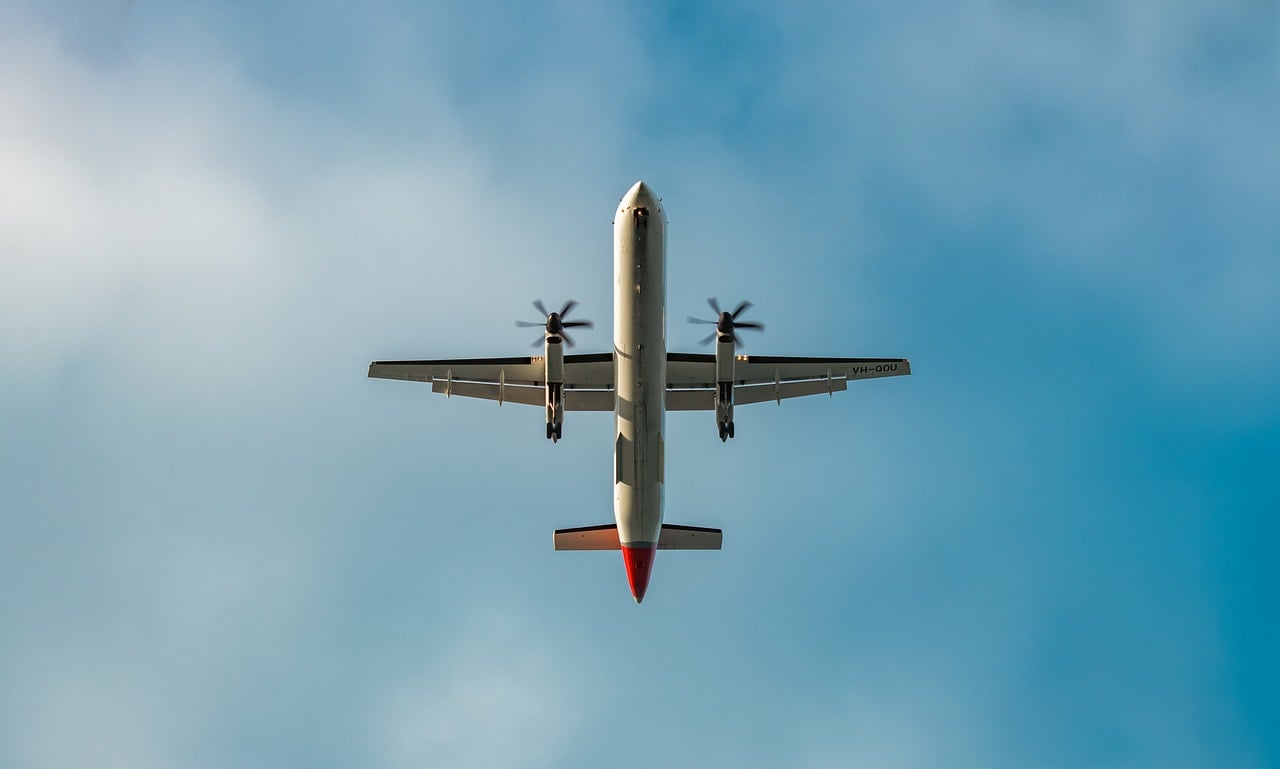The Most Cyber-Secure U.S. Airports and Airlines
Discover the most cyber-secure airports & airlines in the U.S. – ranked by data breaches, WiFi accessibility, & data privacy.
When it comes to flying, security isn’t just about baggage checks – it’s also about how airlines and airports protect your personal data online to provide better peace of mind while traveling. While digital safety is essential, so is staying connected on the go. Using the Holafly eSIM for the USA ensures you can access the internet securely without relying on vulnerable public networks.
Over three million passengers fly in and out of U.S. airports every day. With cybersecurity threats on the rise, travelers need to become more aware of how digital security impacts their journeys.
To help you stay informed and ahead on your data security, the Holafly research team has explored which U.S. airlines and airports rank as the most cyber-secure by analyzing reported data breaches, privacy policies, WiFi services, and search volumes related to data breaches and cyber attacks across the 10 U.S.-operated airlines and 100 of the busiest U.S. airports.
The Most Cyber-Secure U.S. Airlines
Here’s the list of the airlines that provide the most secure digital experience, ranked by how well they protect passengers’ personal data and online safety. These airlines lead the way in secure browsing at 30,000 feet.
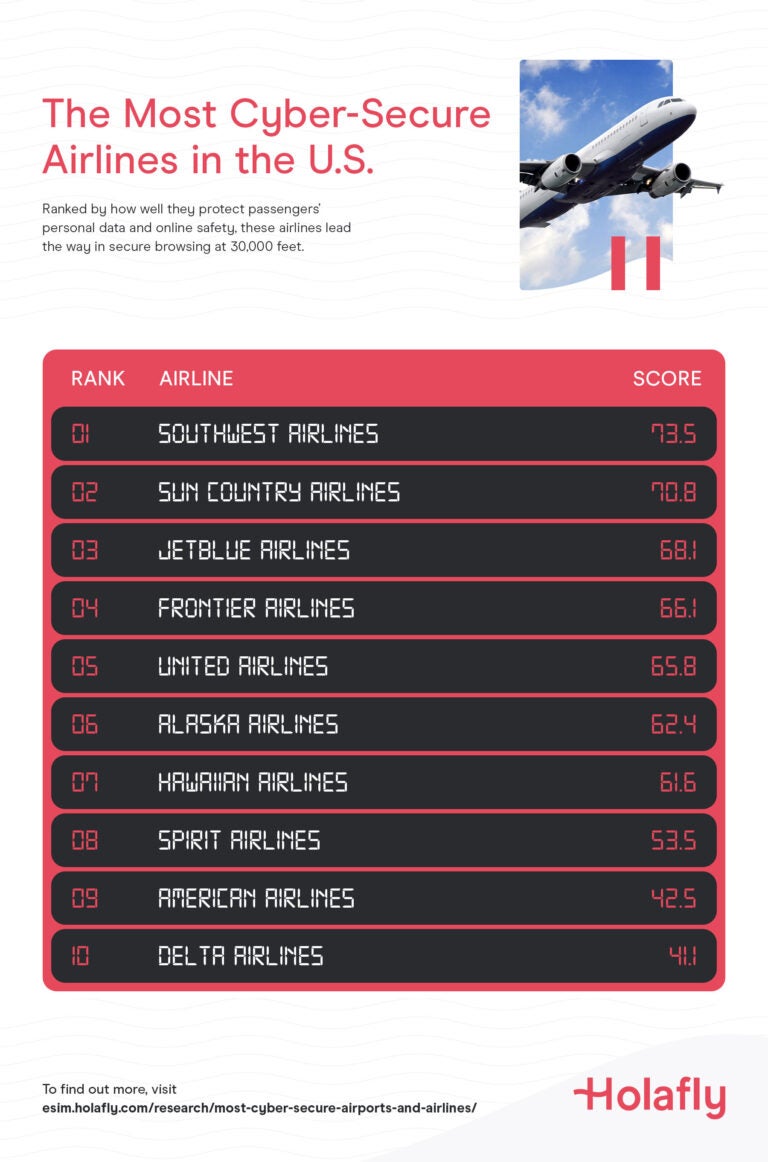
1. Southwest Airlines
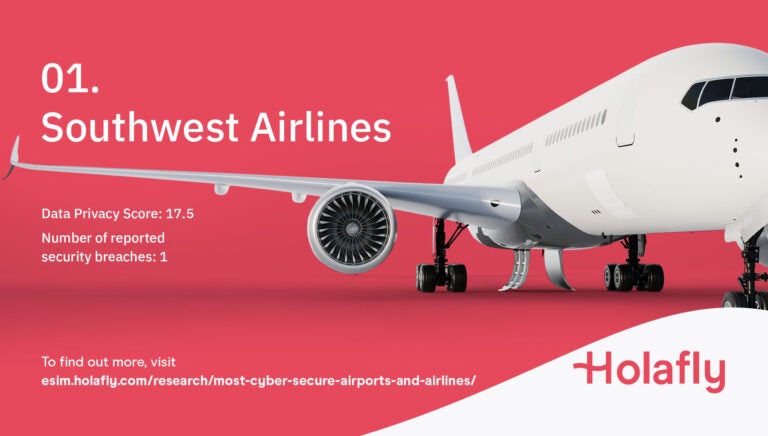
Southwest Airlines takes the top spot as the most cyber-secure airline in the U.S., setting a strong standard for how carriers can safeguard passenger data in an increasingly digital age. According to our analysis, Southwest’s commitment to cybersecurity goes beyond connectivity. While nearly its entire fleet offers WiFi, the airline enforces clear, user-friendly privacy controls that allow travelers to manage cookies, limit data sharing, and opt out of marketing communications.
More importantly, Southwest has only encountered one data breach in the last five years. Combined with free WiFi and access to high-speed connectivity to stream and surf the web, these measures position Southwest as a leader in both convenience and digital safety. For travelers, this means more confidence when booking, browsing, and staying connected in-flight without compromising on security.
2. Sun Country Airlines
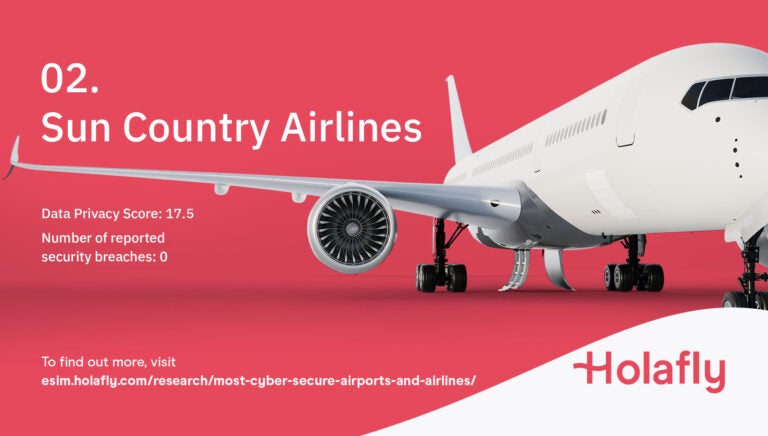
Sun Country Airlines secures its spot as the second most cyber-secure airline in the U.S., showing that even smaller carriers can lead the way in protecting passenger data. The Minneapolis-based airline has had no reported data breaches over the past five years and maintains a moderate approach to data collection and sharing, similar to Southwest.
Though Sun Country does not provide WiFi to its passengers, this helps to boost its high position in passenger cybersecurity as traveler details are less exposed to potential risks – even if onboard connectivity options are less robust than some other airlines.
3. JetBlue Airlines
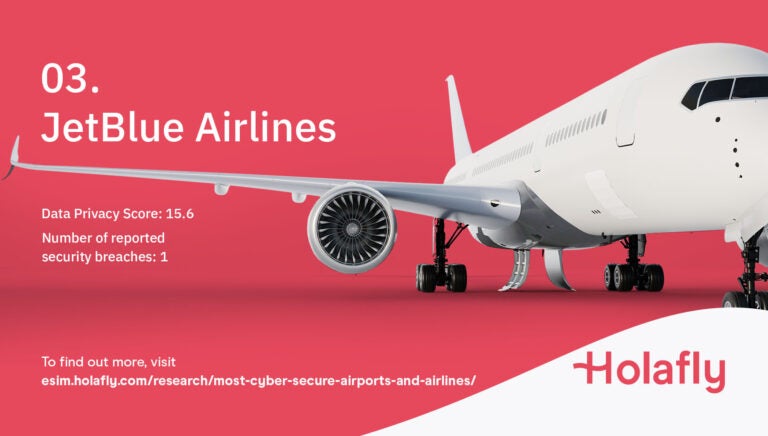
Claiming the third-place spot for the most cyber-secure airline is JetBlue Airlines. The New York City-based airline stands out for maintaining strong cybersecurity standards alongside exceptional in-flight connectivity. While its data collection policies are more extensive than those of Southwest or Sun Country, the airline provides travelers with transparency and control, allowing them to manage cookie preferences and easily unsubscribe from marketing communications.
Combined with a solid security record, having only experienced one data breach over the past five years, the combination of extensive WiFi availability and a relatively secure digital environment solidifies JetBlue’s top three spot.
Most Cyber-Secure U.S. Airports
From WiFi networks to digital safeguards, these airports top the list for keeping travelers’ online activity safe and secure.
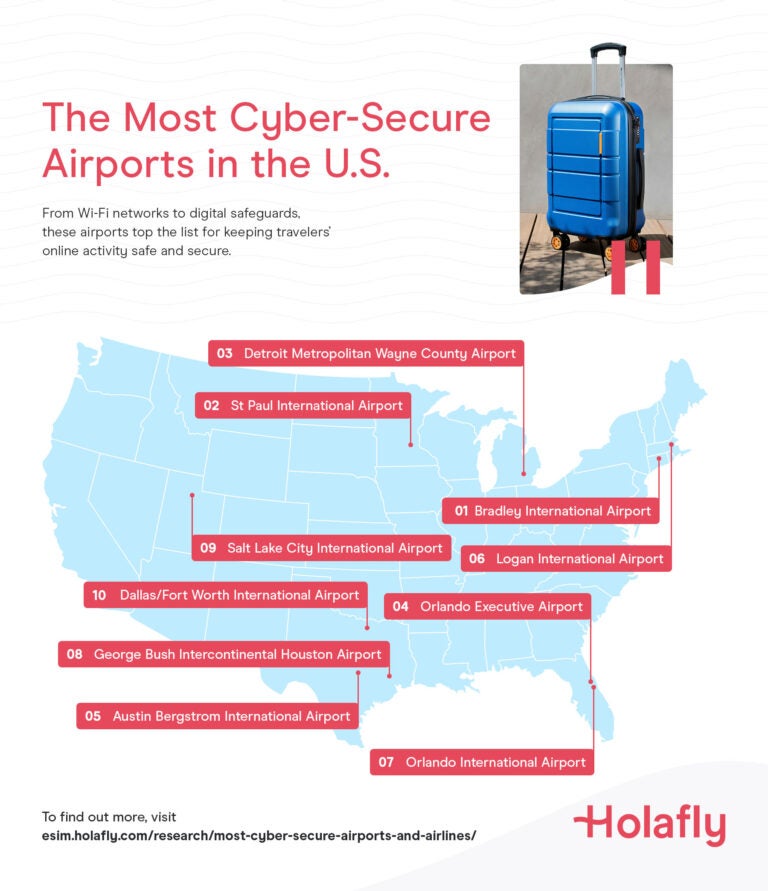
1. Bradley International Airport, CT
Bradley International ranks as the most cyber-secure airport in the U.S., outperforming larger travel hubs across the country. Despite serving just over 3.2 million travelers annually, Bradley takes the extra step to ensure passengers’ data is safe.
When traveling through Bradley International, travelers are able to connect to reliable free WiFi, but don’t need to worry much about their data being compromised, as logs are kept, but their data isn’t up for grabs through reselling.
Travelers are also able to unsubscribe and control what cookies are shared with the airport. With only one recorded data breach throughout the airport’s history, Bradley International demonstrates that even regional airports can lead in cybersecurity, showing scale isn’t the only factor in protecting passenger data.
2. Minneapolis-St. Paul International Airport, MN
Serving over 37 million travelers each year, Minneapolis-St. Paul International is one of the largest airports on our list to earn such a high cybersecurity ranking, coming in at the second most cyber-secure U.S. airport.
This midwestern airport offers free, full-coverage WiFi across all terminals, backed by a data policy that includes no resales and no reported data breaches since the airport’s inception. MSP’s consistent performance in accessibility and security makes it a strong contender when it comes to traveler convenience, paired with digital safeguards.
3. Detroit Metropolitan Wayne County Airport, MI
Handling nearly 30 million travelers annually, Detroit Metro takes the third spot as the most cyber-secure U.S. airport. It provides travelers with free, high-speed WiFi across the airport, but doesn’t skimp on digital safety with a data policy that prohibits the resale of traveler data.
More importantly, Detroit Metro has reported no data breaches since the airport first opened for commercial flights in the 1950’s. For travelers, this means confidence in browsing, streaming, or working while waiting for flights – without the risk of their digital safety being compromised.
4. Orlando Executive Airport, FL
The smallest airport in the ranking, seeing under 3,000 travelers each year, Orlando Executive ranks as the fourth most cyber-secure U.S. airport. Unlike the larger hubs on the list, it enforces strict WiFi privacy safeguards with no third-party sharing or resale and full opt-out control while still offering free, fast WiFi.
In addition to these safeguards, it also has a clean record, with no reported data breaches. For regional and private flyers, Orlando Executive provides an incredibly secure digital environment in an age where even brief connections can expose personal data.
5. Austin-Bergstrom International Airport, TX
Austin-Bergstrom International rounds out the top five most cyber-secure U.S. airports. Serving over 21 million passengers annually, the airport has maintained a zero-breach record since it’s opened, making it one of the safest mid-sized hubs.
As for its data policies, they’re moderate – collecting traveler data, but avoiding its resale – striking a balance between connectivity and privacy. The airport also offers free, full coverage Wifi to passengers traveling through. For travelers making their way through Austin-Bergstrom, this emphasis on digital safety makes it easier to connect confidently while on the move.
6. Boston Logan International Airport, MA
Boston Logan, seeing just over 21 million travelers each year, ranks as the sixth most cyber-secure airport in the country. Similar to the hubs previously mentioned, Logan provides free, full-coverage WiFi for all travelers and has maintained a record of zero data breaches.
Additionally, the airport’s WiFi provider keeps data logs, but avoids the direct resale of traveler data – demonstrating that larger hubs can successfully adapt to evolving digital threats without compromising connectivity.
7. Orlando International Airport, FL
Ranking as the seventh most cyber-secure airport in the U.S. is Orlando International. This hub services over 28 million travelers every year, and despite its high traffic, delivers full WiFi coverage at no extra cost and has no reported data breaches since opening.
Though its data policies are broader – sharing traveler information more extensively with third parties compared to the other airports – it still earns a top 10 spot thanks to its connectivity and solid breach record.
8. George Bush Intercontinental Airport, TX
George Bush Intercontinental sees over 23 million travelers pass through its terminals annually, and ranks as the eighth most cyber-secure airport in the country. It provides travelers with free, airport-wide WiFi and has maintained a spotless breach record since opening to the public in 1969.
Despite this, George Bush Intercontinental data policies lean toward broader third-party sharing, a factor that lowers its overall ranking. This serves as a reminder that even at highly ranked airports, travelers should still use caution when connecting to public networks.
9. Salt Lake City International Airport, UT
Serving over 13.5 million passengers each year, Salt Lake City International ranks as the ninth most cyber-secure U.S. airport. The airport combines free, full WiFi availability with a data breach-free record since Salt Lake City International’s inception.
Alongside this, the airport also has a non-resale data policy, even allowing travelers to control what cookies are shared. Salt Lake International’s balance of connectivity and caution provides reassurance that digital security won’t be compromised in transit.
10. Dallas/Fort Worth International Airport, TX
Finally, rounding out the top 10 most cyber-secure U.S. airports is Dallas-Fort Worth International. The busiest airport in the top 10 ranking, DFW services over 42 million travelers annually. It offers free WiFi across its terminals and has avoided security breaches since opening over 50 years ago.
However, its broader data-sharing policies place it lower in the ranking compared to other airports in the Lone Star State. Still, Dallas-Fort Worth’s ability to provide large-scale connectivity while maintaining a breach-free record underscores its importance as a secure international hub.
Keeping Your Info Safe While Traveling
Even at the most cyber-secure airports and airlines, connecting to public WiFi networks comes with a potential risk. Open networks can be convenient for checking flight updates, downloading boarding passes, or streaming during a layover – but they can also expose travelers to data interception and phishing attempts if proper precautions aren’t taken. If you’re hitting the skies soon, be sure to follow these tips to ensure your data is kept as safe as possible while on the go:
1. Connect carefully
Always verify that you’re joining the airport or airline’s official WiFi network, not a lookalike that hackers could use to intercept your data. If a network name seems suspicious or lacks a secure login page, it’s best to avoid connecting altogether.
2. Limit sensitive activity
Public WiFi networks are convenient, but far from private. Avoid signing in to accounts containing sensitive personal, financial, or professional information. Saving those tasks for when you’re able to get a more secure connection can prevent your credentials from being exposed to potential cyber threats.
3. Encrypt your connection
If public WiFi is your only option, turn on a VPN to encrypt your data and reduce risk of hackers gaining access to your information. Keeping your device’s firewall active also adds an extra layer of protection against unauthorized access.
4. Use an eSIM for safer browsing
Instead of relying on shared airport or cafe WiFi when traveling, you can connect through your own private mobile data with a travel eSIM. It gives you immediate, secure access in hundreds of countries without needing to swap physical SIM cards or depend on unprotected WiFi networks.
5. Stay updated
Cyber threats are constantly evolving, and device software updates typically include vital security patches that protect your devices against new vulnerabilities. Make a habit of updating your phone, laptop, and any apps before every trip to keep your digital defenses strong.
Staying online while traveling shouldn’t mean compromising your security, but with the right precautions, you can stay connected confidently – making sure you’re enjoying seamless, secure connectivity across the globe.
In today’s rapidly changing digital landscape, where cybersecurity and identity verification are flourishing, airports and airlines must prioritize stronger, more advanced security measures. Protecting travelers’ data and digital identities isn’t just a convenience – it’s an essential component of modern travel – enabling a safer, smoother, and truly worry-free journey.
Methodology
We looked to uncover the most cyber secure U.S. airports and airlines by examining reported cyber attacks and data breaches over the past five years and historically, along with certain aspects of their privacy policies and Wi-Fi services — including data collection, third-party sharing, user controls, coverage, cost, and quality, to create a combined data privacy and Wi-Fi score for the 10 U.S. operated airlines and 100 busiest U.S. airports. We then analyzed search volumes for “[airport] + cyber attack” and “[airline] + data breach” of each airport and airline to determine the most cyber secure airport and airline. Data Accurate as of September 26, 2025.





 Language
Language 


















 No results found
No results found








